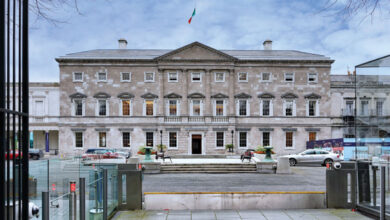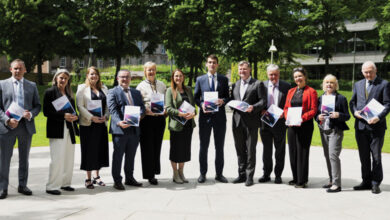The role of Salesforce in transforming public sector organisations

Find out how Salesforce empowers the public sector with cutting-edge transformation, enhanced citizen engagement, streamlined operations, and robust data security.
In today’s fast-paced technological landscape, the imperative for transformation is more evident than ever. Embracing digital transformation brings numerous benefits, from improved service delivery and operational efficiency to significantly enhanced citizen experiences and engagement. Salesforce stands at the forefront of this evolution, providing public sector organisations with the tools they need to modernise and thrive.
As the engine of the Irish economy, the public sector interacts with and supports thousands of citizens daily. Each citizen has unique needs and preferences, making it challenging to deliver personalised, effective, and scalable services. Data is often scattered across various organisations and silos, while processes remain manual, inconsistent, and reliant on individuals to function smoothly. Decision-making can be hard due to a lack of trusted data and insights, leading to delays, inactivity, and poor decision-making.
Citizens are increasingly demanding higher levels of service, inspired by the capabilities of commercial organisations. While each government agency has unique needs and missions, they share common requirements for accelerating digital transformation. A scalable and extensible platform is key. Also the ability to quickly stand up environments and easily configure them with low code or no code. Leveraging pre-built data models, processes, templates, and analytics tailored for government use allows for faster implementation. Finally, we must remember that 70 per cent of transformations are driven by people and processes.
Salesforce’s public sector solutions (PSS) is designed to meet the unique needs of the public sector, offering a rich portfolio of case management applications. Solutions from grants management to license, permit and inspection to composable case management, PSS addresses a wide range of use cases. Its modular, evergreen approach ensures continuous innovation with three upgrades per year, keeping you ahead of evolving requirements, including AI capabilities already available today.
PSS allows you to serve constituents better by:
- deploying IT solutions faster with pre-built components;
- creating new solutions faster with low code tools;
- increasing case worker productivity with automation; and
- reducing time spent on administrative tasks – with AI.
A recent Salesforce Customer Success metrics survey showed the following results while using PSS:
- 21 per cent faster application development;
- 22 per cent decrease in IT costs; and
- 20 per cent decrease in custom development projects.
In a recent research note, IDC recommended that government agencies consider solutions such as publics sector solutions for many reasons – including customer experience. Additionally, Forrester recently published a Republic of Ireland study showcasing a nine-month payback period for government case management, along with other value drivers.
Ultimately Salesforce’s tools automate routine tasks, manage workflows, and improve data sharing across departments. By connecting disparate systems, data flows seamlessly between departments, minimising errors, and accelerating decision-making. This automation frees employees to focus on strategic, value-added activities, boosting productivity and service quality. Streamlined operations reduce costs, ensuring public funds are used effectively, delivering better value for money.
To increase engagement, Salesforce can unify your communication strategy to allow you to be more proactive. This multi-channel approach means citizens engage with services in a way that suits them best. By consolidating data from across the organisation and even consuming external data sources into cohesive profiles, agencies can offer personalised services, anticipate needs, and respond proactively. This citizen-centric approach builds trust and satisfaction, ensuring that public services are accessible, responsive, and tailored to individual needs. Not only does this enhance service levels, but engaged citizens also use services more efficiently, saving effort for the organization and reducing the overall workload. Salesforce recently helped a number of UK police forces adopt a victim journey approach which has led to significant time savings and enhanced citizen satisfaction.
Data security and compliance are paramount in the public sector, and Salesforce prioritises data protection, adhering to stringent security standards and regulations. With features such as encryption, multi-factor authentication, and continuous threat monitoring, public sector organisations can confidently manage and safeguard citizen data. This enhances trust and credibility while reducing the risk of breaches.

At Salesforce we believe in the principle of think big, start small, scale fast, transforming how public sector organisations approach digital transformation. This strategy enables agencies to envision bold, comprehensive goals while taking manageable, impactful steps toward achieving them.
Thinking big involves recognising the potential for comprehensive transformation. Reimagine service delivery, aim for a future where citizen engagement is seamless, operations are efficient, and data security is paramount.
Starting small begins with focused, achievable projects. Salesforce’s low-code and no-code development tools enable public sector agencies to quickly implement solutions for specific issues, such as launching a citizen service portal or automating routine administrative processes. These small-scale initiatives deliver immediate improvements and provide valuable insights and feedback.
Scaling fast capitalises on the agility and scalability of Salesforce’s platform. Once initial projects prove successful, they can be rapidly expanded and integrated into broader systems. This approach ensures that public sector organisations can quickly respond to changing needs and technologies, continuously evolving and improving their services.
In conclusion, embracing this transformation is not merely a strategic choice but a fundamental necessity for delivering efficient, effective, and citizen-centric public services. This approach enhances citizen engagement, streamlines operations, improves data security, fosters innovation, enables data-driven decision-making, facilitates collaboration and transparency, and optimises resources in a fast time to value and scalable way.

T: 0800 086 8949
E: jstobie@salesforce.com
W: www.salesforce.com





